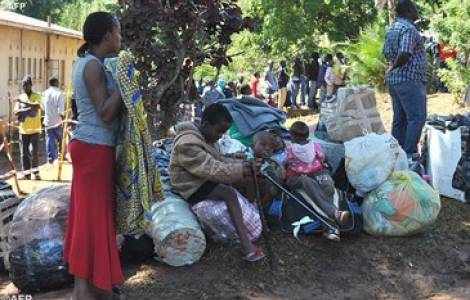
newsva
Durban (Agenzia Fides) - A new xenophobic wave has hit South Africa, while attacks against foreign communities in Durban continue. Gangs of South Africans, mostly poor and unemployed people, attack the homes, shops and activities of immigrants. Recently, dozens of people - many from Malawi - were forced to leave their homes because of an angry mob that ransacked everything. This is not the first time these incidents happen.
"Xenophobia - explains Fr. Philip Ferraro, a Scalabrinian missionary in South Africa, to Fides - is a complex phenomenon which includes political and economic reasons. It is a serious issue that touches thousands of people and that could be solved through profound reforms that affect the social fabric".
South Africa is a potentially rich nation. It has a good industrial fabric and great mineral resources (platinum, gold, diamonds). If policies of redistribution were implemented, then they would have the means to grow in a balanced way and get 20% of the population that lives below the poverty line out of this situation.
"Since the end of apartheid (1994) - continues Father Filippo - politics has not been able to give a profound change to the national economy and to meet the needs of the poorest. Townships are still inhabited by people who live with very few resources. The impact with the arrival of thousands of migrants therefore represents an explosive mixture. Poor South Africans see these new arrivals as smoke in their eyes. Even if, from our research, it emerges that immigrants, by opening shops and small businesses, are a driving force of development that also helps South Africans".
In violence, migrant homes and businesses are often destroyed. Faced with these attacks, politics has an ambiguous attitude. The high institutional offices condemn the attacks. "It is no coincidence that the attacks are returning with the upcoming elections on May 7", Father Filippo continues. “Many candidates oppose South Africans to migrants in order to obtain easy support. The most humble people are persuaded by these arguments and souls are ignited. It should also be taken into account that in South Africa, as in many other African countries, the vote is tied to ethnicity. Therefore, electorally speaking, the contrast with those who do not belong to their own social group functions very well".
At a parliamentary level we are trying to restrict the number of arrivals, making it more difficult to recognize refugee status. "The law on the right to asylum is very liberal while the law on migrants is very restrictive", observes Father Filippo. "So many migrants apply for asylum and the system is collapsing with increasingly long waiting times for the recognition of humanitarian protection. There are pockets of migrants waiting for an answer and illegal migrants. In recent months, a close connection has been made in the political debate. We will see what it brings". (EC) (Agenzia Fides, 25/4/2019)